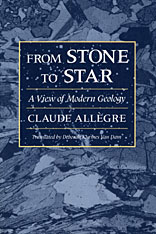
From Stone to Star chronicles one of the great scientific adventures of our time. Written by the eminent geochemist Claude Allègre, it offers a fascinating glimpse into the sophisticated isotopic detective work that has established a geologic chronology of the earth and transformed our understanding of its genesis and history. In eighteenth- and nineteenth-century Europe geologists exploring the earth's surface collected fossils and hotly debated the origin of the layered and folded rocks in which they were embedded.
The development of seismology, the study of earthquakes, in this century shifted the focus from the terrestrial crust to the earth's deep interior. But our knowledge of the chemistry of the earth and of the solar system has been revolutionized by advances in modern laboratory technology and analysis of meteorites and lunar rocks. High resolution mass spectrometry has allowed scientists to explore the very hearts of atoms. The Apollo mission brought back our first samples of the lunar surface, and unmanned space probes have gathered detailed photographs of distant planets.
From Stone to Star provides an engaging account of this exciting new chapter in scientific discovery. Scientists can now measure the isotopic composition of atoms with extreme precision. As miraculous as it may seem, a minute quantity of meteorite yields more information about the structure of the earth and the primitive history of the solar system than years of fieldwork on the earth's surface. Allègre, who was a project scientist during the interplanetary space missions, scrupulously avoids technical jargon. His lucid prose and abiding passion for his subject succeed in creating a superbly readable introduction to the history, methods, and theories of modern geology.

From the earliest use of fire to forge iron tools to the medieval alchemists’ search for the philosopher’s stone, the secrets of the elements have been pursued by human civilization. But, as the authors of this concise history remind us, “disciplines like physics and chemistry have not existed since the beginning of time; they have been built up little by little, and that does not happen without difficulties.” Bernadette Bensaude-Vincent and Isabelle Stengers present chemistry as a science in search of an identity, or rather as a science whose identity has changed in response to its relation to society and to other disciplines. The authors—respected, prolific scholars in history and philosophy of science—have distilled their knowledge into an accessible work, free of jargon. They have written a book deeply enthusiastic about the conceptual, experimental, and technological complexities and challenges with which chemists have grappled over many centuries.
Beginning with chemistry’s polymorphous beginnings, featuring many independent discoveries all over the globe, the narrative then moves to a discussion of chemistry’s niche in the eighteenth-century notion of Natural Philosophy and on to its nineteenth-century days as an exemplar of science as a means of reaching positive knowledge. The authors also address contentious issues of concern to contemporary scientists: whether chemistry has become a service science; whether its status has “declined” because its value lies in assisting the leading-edge research activities of molecular geneticists and materials scientists; or whether it is redefining its agenda.
A History of Chemistry treats chemistry as a study whose subject matter, the nature and behavior of qualitatively different materials, remains constant, while the methods and disciplinary boundaries of the science constantly shift.
READERS
Browse our collection.
PUBLISHERS
See BiblioVault's publisher services.
STUDENT SERVICES
Files for college accessibility offices.
UChicago Accessibility Resources
home | accessibility | search | about | contact us
BiblioVault ® 2001 - 2024
The University of Chicago Press









